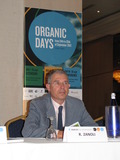On the first conference day, entitled “Organic and Low Input Agriculture: Implementing Innovation to Respond to EU Challenges” a wide range of organic research projects were presented, and the approximately 90 participants were provided with a good overview of current and past projects and research themes. On the second day of the conference, the discussion focused on the challenges for agriculture due to climate change and a growing shortage of water. The three-day event began with a daylong excursion to organic agricultural projects on Cyprus. The organizers were the Cypriot EU Presidency, the Department of Agriculture Cyprus, the Directorate-General for Research of the European Commission, the Technology Platform TP Organics, and the European Union Group of the International Federation of Organic Agriculture Movements (IFOAM EU Group) in cooperation with the local organic association Pasybio.
The main sponsor of the three-day event was the European Commission, which was represented by a number of high-ranking officials: Hans-Jörg Lutzeyer (Directorate-General for Research and Innovation), as the initiator of the event, Hans-Christian Beaumond and Inge van Oost (Directorate-General for Agriculture) and also Barna Kovacs (Directorate-General for Research and Innovation).
“Setting priorities is of great importance for the promotion of organic research in the future,” declared Marco Schlüter, the head of the IFOAM EU Group, which is based in Brussels. “We have to position ourselves, because the genetic engineering industry, which currently provides less than 0.1 % of land with seed, is claiming a large amount of funding.” Schlüter is convinced that “organic agriculture could achieve even better results if research in this area was intensified”. His focus is therefore on “image branding with a clear organic research programme.” The Technology platform TP Organics, which was founded in 2008, integrates views of the organic sector and civil society to represent a broad perspective on research and development priorities. It plays a key role in highlighting where the focus of research and development funding should be placed.
“We’re talking about the next 100 years, and organic agriculture is one of the solutions for that time period,” was Schlüter’s confident judgment. He said that it was important to develop research proposals, elaborated work programmes and lists of topics for the next framework programme of research called “Horizon 2020”. (Picture on left: Eduardo Cuoco, Anamarija Slabe and Marco Schlüter from TP Organics at the conference in Cyprus)
Hans-Jörg Lutzeyer of DG Research, who recently took over responsibility for organic research, gave a detailed introduction to the themes and presented a new publication by the European Commission that lists current and past research projects related to organic and low input agriculture and provides background information. From 2000 to 2012, more than 50 research projects were supported with funds from the EU with a total amount of 150 million euros. He gave a detailed account of the criteria and aims of the eighth research period from 2014 to 2020 – called Horizon 2020. “We’re relying on the diversity of agricultural systems to cope with price and climate shocks in the future,” he explained.
The project OrganicDataNetwork, which was launched at the beginning of 2012, was presented by Professor Raffaele Zanoli (picture). “Our objective is to set up long-term cooperation between the partners,” said Zanoli, who is a Professor at the University of Marche in Ancona in Italy. The aim of the 15 participants from ten countries is to develop a methodology within the three years of the project. The project is being financed by a grant from the European Commission. The funds cover 1.5 million euros of the total costs of 1.9 million euros. To ensure that all member states are involved, the project is collaborating with around another 50 partners. Whilst there have been surveys of the organic market in a number of countries for many years, they do not exist in all countries. A first workshop to deal with the challenges of data quality and availability will be held early in 2013.
The initiator of the conference Hans-Jörg Lutzeyer expressed his thanks to all attendees for their contribution to the great success of the conference.
Author: Kai Kreuzer, Organic-Market.info
Further information
Links
- OrganicDays.eu:Website of the Organic Days
- OrganicDays.eu: Webpage on the research conference during the Organic Days
- OrganicDays.eu: Presentation of the OrganicDatanetwork project by Dr. Raffaele Zanoli
- Organic-Research.net: New inventory: A decade of EU-funded, low-input and organic agriculture research (2000-2012)
- Organic-Europe.net: Organic food and farming research in Europe
- Organic-Market.info: Conference promotes networks in organic research




 tap and then scroll down to the Add to Home Screen command.
tap and then scroll down to the Add to Home Screen command.